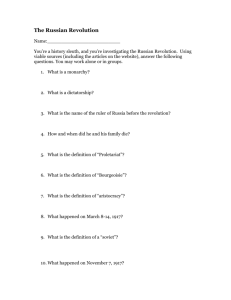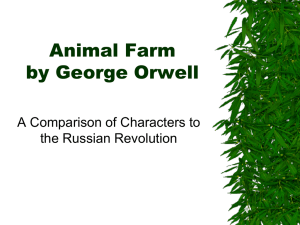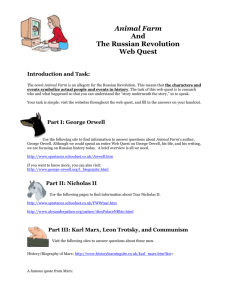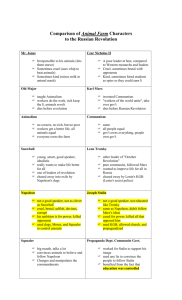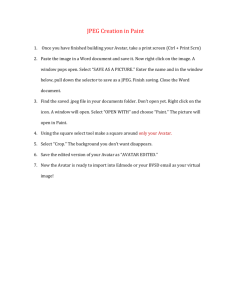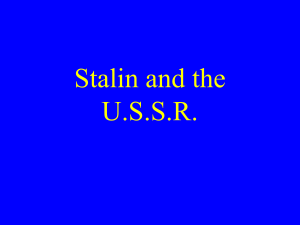AF PreReading Packet (Communism, Russian Rev, Allegory, Satire).
advertisement
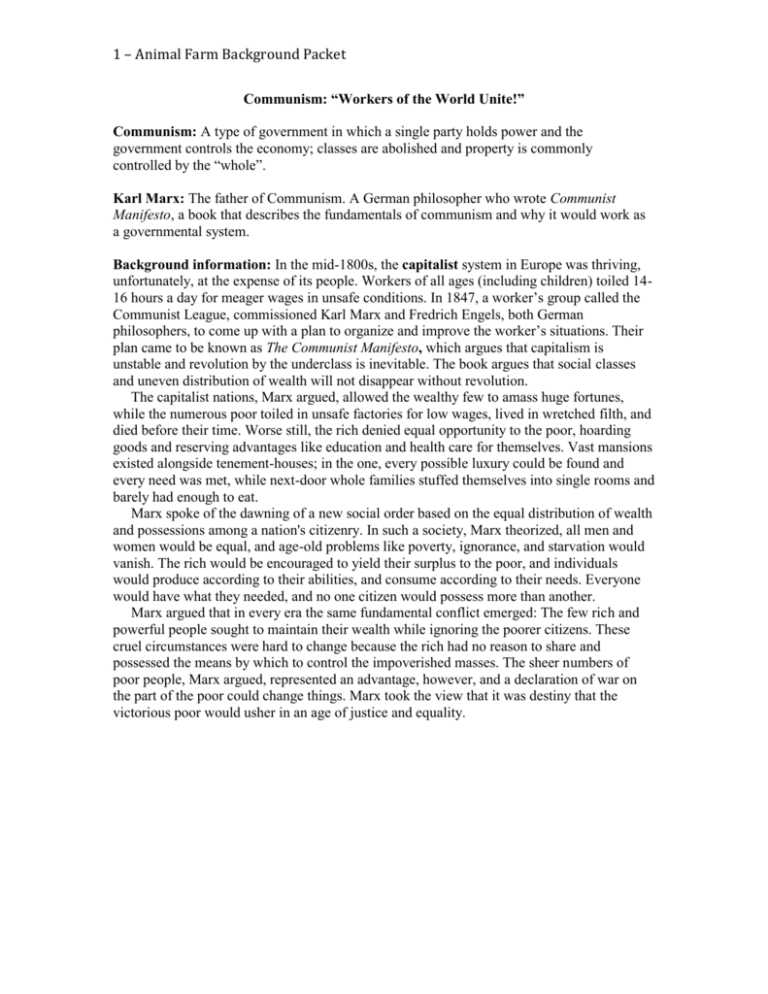
1 – Animal Farm Background Packet Communism: “Workers of the World Unite!” Communism: A type of government in which a single party holds power and the government controls the economy; classes are abolished and property is commonly controlled by the “whole”. Karl Marx: The father of Communism. A German philosopher who wrote Communist Manifesto, a book that describes the fundamentals of communism and why it would work as a governmental system. Background information: In the mid-1800s, the capitalist system in Europe was thriving, unfortunately, at the expense of its people. Workers of all ages (including children) toiled 1416 hours a day for meager wages in unsafe conditions. In 1847, a worker’s group called the Communist League, commissioned Karl Marx and Fredrich Engels, both German philosophers, to come up with a plan to organize and improve the worker’s situations. Their plan came to be known as The Communist Manifesto, which argues that capitalism is unstable and revolution by the underclass is inevitable. The book argues that social classes and uneven distribution of wealth will not disappear without revolution. The capitalist nations, Marx argued, allowed the wealthy few to amass huge fortunes, while the numerous poor toiled in unsafe factories for low wages, lived in wretched filth, and died before their time. Worse still, the rich denied equal opportunity to the poor, hoarding goods and reserving advantages like education and health care for themselves. Vast mansions existed alongside tenement-houses; in the one, every possible luxury could be found and every need was met, while next-door whole families stuffed themselves into single rooms and barely had enough to eat. Marx spoke of the dawning of a new social order based on the equal distribution of wealth and possessions among a nation's citizenry. In such a society, Marx theorized, all men and women would be equal, and age-old problems like poverty, ignorance, and starvation would vanish. The rich would be encouraged to yield their surplus to the poor, and individuals would produce according to their abilities, and consume according to their needs. Everyone would have what they needed, and no one citizen would possess more than another. Marx argued that in every era the same fundamental conflict emerged: The few rich and powerful people sought to maintain their wealth while ignoring the poorer citizens. These cruel circumstances were hard to change because the rich had no reason to share and possessed the means by which to control the impoverished masses. The sheer numbers of poor people, Marx argued, represented an advantage, however, and a declaration of war on the part of the poor could change things. Marx took the view that it was destiny that the victorious poor would usher in an age of justice and equality. 2 – Animal Farm Background Packet DIRECTIONS: Answer the questions below. Cite evidence from the text to support your answers. 1. Karl Marx believed that in order for social classes and uneven distribution of wealth to end, what needed to happen? 2. What new social order would develop as a result of communism? 3. Why did Marx believe that age-old problems like poverty, ignorance, and starvation would vanish? Explain how it could happen. 4. What kind of advantage do the poor have against the rich if a declaration of war broke out between them? Explain in your own words. Directions: Make inferences and/or draw conclusions based on analysis of a text. 5. The article reads, “Vast mansions existed alongside tenement-houses; in the one, every possible luxury could be found and every need was met, while next-door whole families stuffed themselves into single rooms and ate meager rations”. Can expensive mansions existing alongside less fortunate homes be seen today here in the United States? 6. In today’s society, do you think it’s fair that the extremely wealthy are able to live lavishly, with a lot of extra comfort and luxury, while others struggle just to get by on a day-to-day basis? 3 – Animal Farm Background Packet The Russian Revolution Important Names: Czar Nicholas II: The last Czar of Russia. He was a poor leader who was comparable to with European kings and other monarchs. He was nicknamed Nicholas the Bloody for his cruel, sometimes brutal, actions against his own people. Vladmir Lenin: He was the leader of the Bolshevik Party, a political party that believed in communism. He died after the Russian Revolution. Leon Trotsky: He was the hero of the early revolution. Trotsky was an ideal communist and wanted to improve life for all people in Russia. He was expelled by Stalin and his KGB (secret police). Joseph Stalin: He was the head of the Communist Party. Stalin expelled Leon Trotsky and seized power of the government after Lenin’s death. Hungry for power, he murdered or expelled anyone who challenged him. Stalin used the KGB and propaganda to remain in power for a long time. The History: In the early 1900s, Russia’s Czar Nicholas II faced an increasingly discontented population. Freed from feudal serfdom in 1861, many Russian peasants were struggling to survive under an oppressive government. The government oppressed the people and conducted violent executions that terrorized the entire country. Under the leadership of Vladimir Lenin, a Communist political party called the Bolshevik Party was formed. By 1917, amidst the tremendous suffering of World War I, the Bolsheviks had had enough. They led a revolution and after two battles successfully overthrew the czarist regime and set up the new government of the Union of Soviet Socialist Republics, led by Lenin. In 1924, Lenin died. His death sparked a bitter battle between his former colleagues, Leon Trotsky and Joseph Stalin. Leon Trotsky was the hero of the early Revolution and a strong follower of Marxist theory (which encouraged complete socialism). Joseph Stalin was head of the Communist Party and had different opinions than Leon Trotsky. Stalin gained control, expelled Trotsky from the Communist Party, and ordered him out of the country. Once in power, Stalin moved the Soviet Union into the modern industrial age. However, this rapid growth was not well planned and resulted in the famine of 1932-1933, which killed millions. Stalin’s Five Year Plan was an attempt to modernize Soviet industry by setting ambitious economic development goals at 5-year intervals. While many of his goals were not accomplished, the government often covered up its failures by lying to its people about the country’s progress. While many peasants resisted the Stalin regime, Stalin essentially killed anyone who opposed him. In total, 20 million government officials and ordinary citizens were murdered. The government controlled the flow and content of information to the people, and all but outlawed churches. Ironically, what started out as Communism turned into Totalitarianism. Stalin remained in power until his death in 1953. 4 – Animal Farm Background Packet Animal Farm: An Allegory and Satire on the Russian Revolution Allegory- An allegory is a story that can be read on multiple levels. It can be read on a literal level, as well as AT LEAST one symbolic/metaphorical level. Animal Farm tells the story of Farmer Jones’ animals who rise up in rebellion and take over the farm. Tired of being exploited solely for human gain, the animals—who have human characteristics such as the power of speech—vow to create a new and more just society. This short novel can be seen as an allegory to the Russian Revolution. Every character in the book represents someone that lived during the Russian Revolution. Most of the events that take place in this novel are representative of actual events that happened during the revolution and after Stalin seized control. --Satire- A satire is a literary work in which a writer attacks a serious issue by presenting it in a ridiculous light, or otherwise by making fun of it. Orwell uses satire to expose what he saw as a myth of Soviet socialism. Thus, the novel tells a story that people of all ages can understand, but it also tells us a second story- that of a real-life Revolution. Many critics have matched in great detail the story’s characters to historical persons. 5 – Animal Farm Background Packet An Introduction to Allegory Using Avatar Background: An allegory is a work that can be understood on multiple levels. While the movie Avatar isn’t the most perfect example, it is fairly easy to connect its story to several other stories involving colonization. In class, we’ll focus on connecting Avatar to the story of the earliest Native Americans and their savage murder by early colonists. Directions: Read the two short stories below. Then, take the characters, things, or places from Avatar and pair them with what they REPRESENT historically. Jake Sully is a marine who was injured in battle. As a result, he’s a paraplegic (paralyzed from the waist down). The government is unwilling to repair his legs, so he’s in a wheelchair. After his twin brother is killed, Jake takes his place on a project on Pandora, a distant planet. People from Earth need a rare mineral found there in order to solve the humans’ energy crisis, which may result in the Earth’s destruction. The mineral is called Unobtainium (Pronounced: Un-Ob-Tain-EE-Um), and it can be found under the “Home Tree,” where native Pandorans live. The Pandorans have no interests in allowing humans to disrupt their living place in order to mine Unobtainium. Thus, a conflict of interest develops. Pandora is a hostile environment for humans. The air is toxic, and the wilderness is filled with prehistoric-like savage beasts that are extremely dangerous. Scientists have taken the DNA from the indigenous Pandorans, a human-like tribe called the Na’vi, and combined it with human DNA to create avatars. Essentially, the avatars help human researchers, among them Grace Augustine and Norman Spellman, figure out more about the Na’vi way of life and life on Pandora. These scientists, and eventually Jake Sully too, support the preservation of the Na’vi way of life and are more interested in science than Unobtainium. Colonel Quaritch has other priorities. He is hell-bent on displacing the Na’vi so that he can mine Unobtainium and save Earth. At first, Jake Sully sympathizes with the Colonel’s positions, but he soon finds himself indebted to a beautiful member of the Na’vi tribe, Neytiri (Pronounced: Nit – Ear – E), who saves his life. Jake soon falls in love with Neytiri and is accepted into the tribe. Jake wishes to remain a Na’vi and protect its people from the destruction the colonel has planned. A war is waged between the Na’vi and the human troops. Many Na’vi die in an effort to save their way of life. A Short History of Native Americans (My interpretation): When Christopher Columbus arrived in 1492, Europeans thought they had literally stumbled onto a goldmine. They looked around and saw a land of opportunity that would make them a lot of money. Over the next 300 years, Europeans of all types would travel to the Americas in search of precious minerals (gold), resources, and other opportunities. Unfortunately, the newcomers treated the Native Americans that were already living on this land extremely poorly. Thousands of native peoples were brutally murdered, maimed, enslaved, or displaced as a result of the influx of European immigrants flocking into the Americas in search of great riches. Though some people were generally against the exploitation of the Native Americans, many Europeans totally ignored the human rights of the natives. The result was many lopsided battles that ended in favor of the more technologically-advanced European immigrants. The systematic extinction of the Native American population is a tragic example of greed, exploitation, and racism in our country’s history. 6 – Animal Farm Background Packet Allegorical Check for Understanding (14 Points): Directions: Match the characters, things, or places from Avatar and pair each with what they REPRESENT historically. Avatar 1. Scientific Team, Grace Augustine and Norman Spellman 2. Europe 3. The Home Tree 4. Colonel Quaritch, the Army, and Big Business 5. Pandora 6. The Na’vi 7. Unobtainium Early American Colonization 1. Native Americans 2. America 3. Valuable Land 4. Gold and other resources 5. The British colonists 6. Sympathizers to the Native American cause 7. Earth WRITE PAIRS HERE: 1. Avatar: Early American Colonization: 2. Avatar: Early American Colonization: 3. Avatar: Early American Colonization: 4. Avatar: Early American Colonization: 5. Avatar: Early American Colonization: 6. Avatar: Early American Colonization: 7. Avatar: Early American Colonization:
